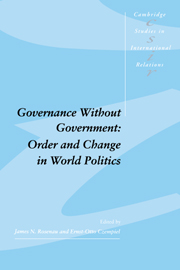Book contents
- Frontmatter
- Contents
- Notes on contributors
- Preface
- 1 Governance, order, and change in world politics
- 2 Governance without government: polyarchy in nineteenth-century European international politics
- 3 The decaying pillars of the Westphalian temple: implications for international order and governance
- 4 The “triumph” of neoclassical economics in the developing world: policy convergence and bases of governance in the international economic order
- 5 Towards a post-hegemonic conceptualization of v/orld order: reflections on the relevancy of Ibn Khaldun
- 6 The effectiveness of international institutions: hard cases and critical variables
- 7 Explaining the regulation of transnational practices: a state-building approach
- 8 “And still it moves!” State interests and social forces in the European Community
- 9 Governance and democratization
- 10 Citizenship in a changing global order
- Index
10 - Citizenship in a changing global order
Published online by Cambridge University Press: 13 October 2009
- Frontmatter
- Contents
- Notes on contributors
- Preface
- 1 Governance, order, and change in world politics
- 2 Governance without government: polyarchy in nineteenth-century European international politics
- 3 The decaying pillars of the Westphalian temple: implications for international order and governance
- 4 The “triumph” of neoclassical economics in the developing world: policy convergence and bases of governance in the international economic order
- 5 Towards a post-hegemonic conceptualization of v/orld order: reflections on the relevancy of Ibn Khaldun
- 6 The effectiveness of international institutions: hard cases and critical variables
- 7 Explaining the regulation of transnational practices: a state-building approach
- 8 “And still it moves!” State interests and social forces in the European Community
- 9 Governance and democratization
- 10 Citizenship in a changing global order
- Index
Summary
If world politics is presently marked by the emergence of new forms of governance without government, what does this imply for the world's citizens who have long been accustomed to governance being sustained by governments? How do they respond to authorities who are not created by constitutions, who are not located in formal governmental structures, and whose legitimacy may be in flux? And whatever may be their responses, can there be profound transformations in the nature of global governance without alterations in the skills and orientations of citizens? That is, if new dimensions of citizenship are likely to evolve in response to the emergent global order, how will they in turn shape the way in which the new institutions of governance develop?
Such are the questions addressed by this concluding chapter. It explores possible relationships between the emergence of a new global order – the foundations of which were laid well before the end of the Cold War – and the changing competence of people throughout the world. In so doing it seeks to demonstrate that such vast transformations as the emergence of a new order at the macro level of politics cannot occur without corresponding, or at least compatible, changes taking place among citizens at the micro level.
- Type
- Chapter
- Information
- Governance without GovernmentOrder and Change in World Politics, pp. 272 - 294Publisher: Cambridge University PressPrint publication year: 1992
- 28
- Cited by

